BattleTech Review-in-Progress
The detailed tabletop strategy game turns into a detailed digital strategy game.
This article first appeared on USgamer, a partner publication of VG247. Some content, such as this article, has been migrated to VG247 for posterity after USgamer's closure - but it has not been edited or further vetted by the VG247 team.
If you've ever ever played XCOM 2 and thought to yourself, "Man, I wish there were even more management and upkeep options available", then Harebrained Schemes and Paradox Interactive have a game for you.
Welcome to the year 3025. In the grim darkness of the far future, there is only war. Wait, that's a reference to another science-fiction tabletop game, but the comparison holds here. In the BattleTech universe, a number of great noble houses fight for control of the galaxy, sometimes through direct wars, but frequently through mercenaries that fight by proxy. These conflicts are fought with BattleMechs, giant bipedal tanks that stomp over the battlefield and any foes in their path.

You're a Commander in charge of a small team of ragtag mercenaries. A few years ago, you were almost something: a trained MechWarrior in service to Lady Kamea Arano, who was in line to take over the grand Aurigan Reach kingdom. Instead, a coup by her uncle Lord Santiago Espinosa left her for dead and killed your mentor. Now you're just a mercenary trying to make their way in the galaxy.
Given its work on the Shadowrun games, Harebrained Schemes put a fair amount of work into providing a role-playing layer to BattleTech. You can set your name, callsign, appearance, story background, and personal pronoun early on in the game and your choices affect your character's starting stats and provide unique options in dialog trees. But to be perfectly honest, the role-playing isn't really the point. You could've been the faceless, nameless Commander of the XCOM titles and BattleTech would've still worked, because you don't necessarily engage with the role-playing side all that much.
Instead, most of BattleTech is split between two halves: turn-based tactical combat and management upkeep.
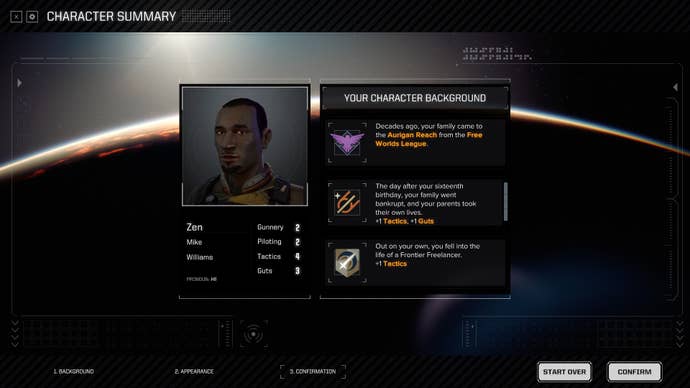
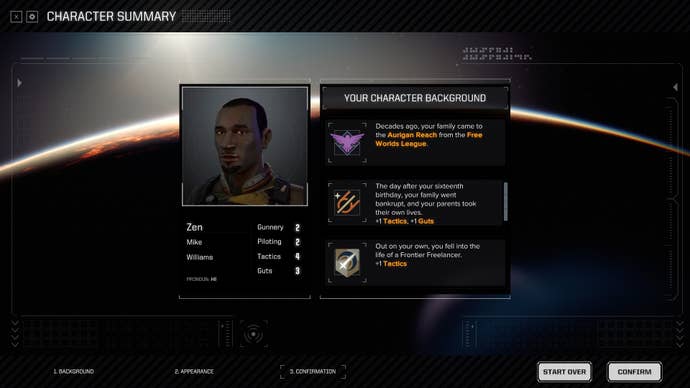
In The Trenches
Your crew will take contracts on various planets with their own objectives that most strategy players will be used to: go here, kill everyone, hold this spot, etc. You launch each mission with lance of four, each pilot handling their assigned BattleMech.
BattleTech overall feels on the more aggressive side of strategy games. Unlike XCOM and XCOM 2 which are fairly defense-heavy, relying on cover and overwatch for many conflicts, BattleTech wants the player to be on the offensive. There is cover in terms of forests and buildings, but you'll find a lot of it doesn't last all that long.
It's more useful to rely on a mechanic called Evasion. You have three movement options: Move, Sprint, and Jump Jets. If you Move or Sprint—the latter takes you a greater distance, but you can't attack—you gain Evasion points the farther you move. These Evasion points are used against each incoming attack to lower hit chance. Evasion is fairly key is BattleTech, in that you'll find it's good to run in, hope the Evasion charges keep the damage low, use the next turn to attack, and then run out again. You can counter Evasion with the Sensor Lock ability, but that's only if you remember to have it available.
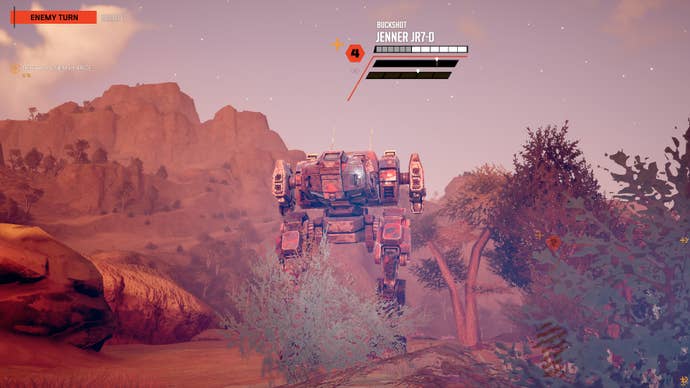
The other mechanic you have to keep in mind is Heat. Every attack adds a certain amount of Heat to your BattleMech, as does using certain abilities like Jump Jets to change elevation. This means a certain amount of micro-management each time you attack: if a BattleMech has a target at close-range, you want to turn off your long-range weapons for that attack round to conserve heat. You can dump heat in environmental features like lakes and some maps either increase or decrease heat gain depending on their biomes.
Those are the major facets of combat, but BattleTech tries to cram as much of the tabletop game into its PC counterpart. You have to worry about stability on certain terrain and your mech can be knocked down. Most hits are body shots, hitting BattleMech parts roughly on the side the attack came from, but you can target certain parts once a mech is knocked down. Pilots are technically separate from the BattleMechs; they can be injured or incapacitated with a lucky attack or precision attack.
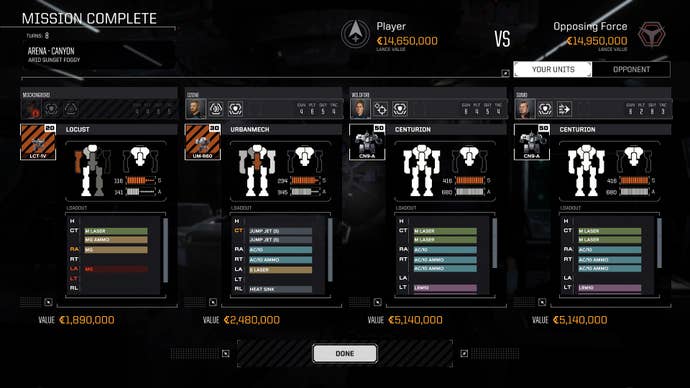
Mercenary Manager 3025
If you survive your contract or mission, it's back to your ship. Again, if you play XCOM or XCOM 2, you are not ready for this management sim. Pilots work largely like XCOM: if they're injured (not killed in action), they sit in the med bay for a certain amount days. That means you need to have a fairly strong stable of pilots on hand to switch them in and out. Each pilot gains experience in combat, which can be used to level them up in four lines of skills: Gunnery, Piloting, Guts, and Tactics. Every pilot also draws a monthly salary out of your coffers, whether or not they're in the infirmary. Lose a pilot and you can hire a new one for a finders fee.
You also have to manage the BattleMechs. Here's where things get really complex. BattleMechs have different weight classes (Light class moves farther and faster) and various frames. Each frame has a number of hardpoints that you can equip weapons or support equipment onto and a certain maximum weight. You have to balance the offensive capabilities you want on the mech with Armor, which also costs weight.
As I noted before, each weapon comes with a Heat cost, which is something to keep in mind: no reason to fill up a mech with tons of guns if it overheats when it tries to fire them. You can add heat sinks to lower the chance of an overheat, but again... heat sinks have a weight. It's a delicate balance and you'll find that you need to have your mechs fairly specialized to keep them functional. You can strip them bare and rebuild their loadouts from the ground up, but it's time-consuming.
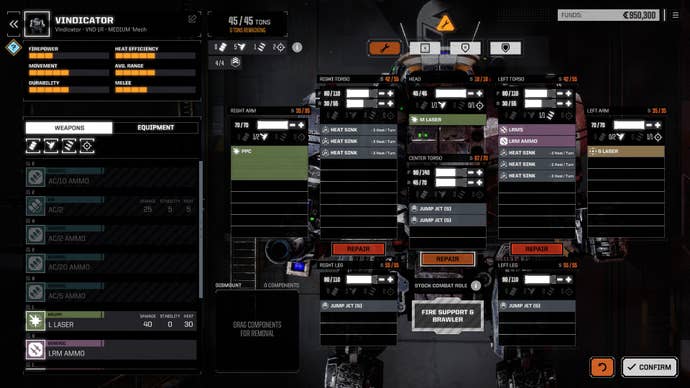
"Fairly time-consuming" explains a lot of BattleTech when it comes to the mechs. It'll take quite a while to learn all of the available weapons, which hardpoints they can fit onto, the weight ranges of a specific frame, and more. And they cost a pretty penny if you're not doing too well in the battles. You will lose arms, legs, and weapons, and you'll have to repair and replace as needed. Refitting also costs time as well as money, meaning you can't just refit your lead mech and expect it to be ready for the next contract.
As a Commander, you'll have to juggle all that and much, much more. Contracts come from various factions and you can't go all-in on one, because the factions also offer different weapons you'll probably need from their respective stores. You also have to balance your overall reputation: each contract has pay and salvage sliders, and lowering both increases your reputation gain. You can't even hire certain MechWarriors if your rep isn't high enough.
Money makes everything work and as far as I can tell, bankruptcy is the ultimate loss benchmark. If you don't have money, you can't do much of anything in BattleTech. Traveling costs money and hyperspace costs even more. Ammo costs money, as do repairs. And unpaid pilots are unhappy pilots. You can take out a loan to keep on fighting, but you begin the game worrying about debt. Bankruptcy itself feels far away, but sometimes it feels like you're
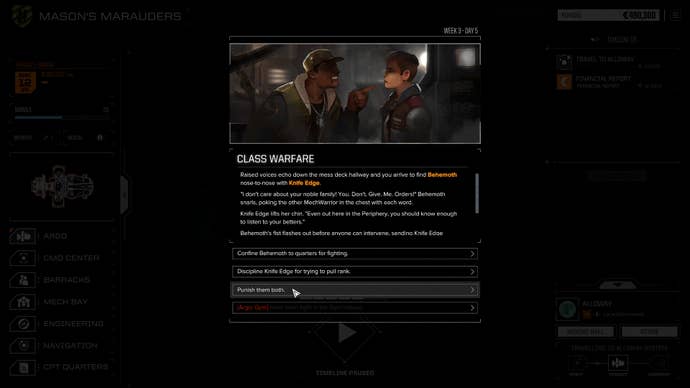
It's like grafting Football Manager onto your favorite tactics strategy game. BattleTech is a lot to take in and I get the feeling it's hyper-focused on existing BattleTech fans, which makes sense as those fans are the ones who funded the Kickstarter to the tune of $2.7 million. Harebrained Schemes' focus was on bringing as much of the BattleTech tabletop game over to the PC and they succeed in that. I did find myself a bit exasperated early on with the cost and management aspects. If you're willing to stick with it, eventually you'll begin to mentally compartmentalize all of the information thrown at you. I'm unsure how many will stick it out though; this is a game for a specific type of person.
BattleTech does need to clean up a few of the rough edges too. Performance was spotty in combat, whether the game was in the standard overhead camera or the more cinematic movement cam. You can customize your overall company, but I would've liked per BattleMech options and the colors offered don't really 'pop'. Even with the brightest colors, it feels muted. The performance problem is one of optimization, which I'm certain the developer will fix in the months to come. The customization options might be improved, but the crystal ball is a bit more fuzzy in that respect.
After dropping almost 1,400 words into BattleTech, you may be wondering why I'm not just giving it a score. Currently, it's not my favorite tactical strategy experience, but I admit I enjoy seeing my BattleMechs tromping across the landscape to stomp out a fallen foe. Unfortunately, I need to finally finish the game's story campaign and drop a bit more time in the additional multiplayer mode, which I haven't touched at all. Once I get those under my belt, I'll be back with a final score.

